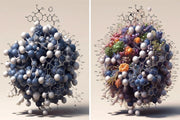The Full Spectrum: Why Vitamins Are More Than Just One Molecule

In the realm of nutrition, vitamins are often viewed as singular entities and simple molecules that check off daily nutritional boxes. However, this perspective barely scratches the surface of the complex and dynamic roles that vitamins play in our health. Contrary to popular belief, vitamins are not just isolated molecules; they are intricate groups of compounds that work synergistically to support our bodies. Let’s delve into the multifaceted nature of vitamins, exploring how this understanding can revolutionize our approach to daily nutrition.
The Misconception of Simplicity
When we take a vitamin C supplement, most of us think we're merely ingesting ascorbic acid. While it's true that ascorbic acid is a primary component, vitamin C also includes a broader complex of related compounds that contribute to its effectiveness. These additional components can include bioflavonoids, which enhance the absorption and antioxidant capability of vitamin C, making it much more than just a single molecule.
Similarly, vitamin E is often reduced to one compound in public perception, but it is actually a family of molecules, including both tocopherols and tocotrienols. Each member of this vitamin E family has unique properties and roles, contributing to the vitamin’s overall antioxidant and health-promoting effects.

Why Complexity Matters
Understanding that vitamins consist of multiple molecules is crucial for several reasons:
1. Enhanced Bioavailability
The different components of a vitamin often work together to improve the way our bodies absorb and use the vitamin. For example, the natural mix of tocopherols and tocotrienols in vitamin E is more effectively utilized by the body than an isolated supplement containing only one form.
2. Broader Protective Effects
The complex of compounds in each vitamin can provide a broader range of antioxidant and protective effects than a single compound alone. This is seen in the diverse roles tocotrienols and tocopherols play in protecting against oxidative stress and supporting cardiovascular health.
3. Improved Efficacy
In nature, vitamins typically do not exist in isolation; they are part of a matrix that includes other beneficial compounds. This natural synergy enhances the vitamin’s function and overall health benefits, supporting everything from immune function to skin health.
Image Suggestion: An infographic illustrating how different components of a vitamin interact synergistically, enhancing absorption, protection, and efficacy.
Shifting Our Nutritional Approach
Armed with the knowledge that vitamins are more complex than once thought, we can shift our approach to supplementation and diet. Instead of focusing on isolated vitamins, we might consider whole-food supplements or a diet rich in a variety of foods, which naturally contain these vitamin complexes. This approach not only provides the vitamins themselves but also the ancillary compounds that optimize their functions.

Conclusion: Embracing Vitamin Complexity
As we peel back the layers of what it means to truly nourish our bodies, it becomes clear that the simplistic view of vitamins does not suffice. By understanding and embracing the complex nature of vitamins, we can better appreciate the nuances of nutrition and make informed choices that enhance our health in more complete and effective ways. Vitamins are indeed much more than single molecules they are whole systems that nourish, protect, and sustain our bodies in myriad ways.

This deeper understanding challenges us to look beyond the bottle of supplements and towards a more holistic, informed approach to health and wellness.

















